Cards Cards Cards | Splinterlands New User Guide (2025) | Article 3 of 7


Introduction
This is article #3 in the series. Today we are going to walk through Cards and everything you as a new player should know or at least be familiar with.

Links to All Articles (once published)
Article #1 - Just Getting Started
Article #2 - Battling & Strategy
Article #3 - Cards Cards Cards
Article #4 - All Currencies
Article #5 - Items
Article #6 - Guilds & Gladiators
Article #7 - Everything Else & More

Summoners versus Units
If you boil down all the Splinterlands cards they fit into 1 of 2 categories, but never both though!
Summoners
A Summoner is basically your General in battle. He (or she) does not do any actual fighting in the battle. However some of them are awesome and give powerful benefits to your Unit cards. In every battle you HAVE to pick a Summoner (and luckily for you even if you just started out you are gifted some 'starter' Summoners to use).
The easiset way to see Summoners is to go to your 'Items' tab and then 'Cards' section and only select 'Summoner'.
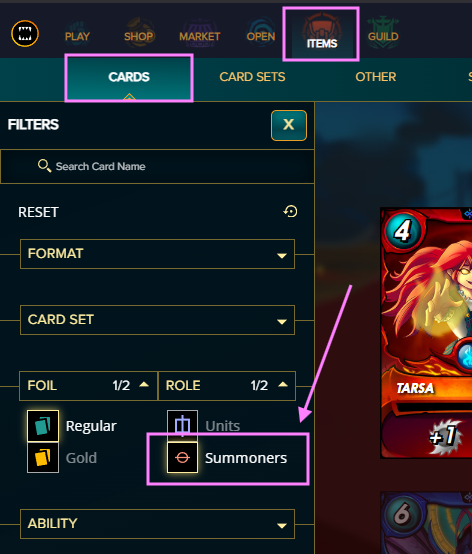
Then you can search by filter for cards you own, playable cards, etc, etc.
Summoners are pivotal if you want to level up your game and your cards. You can upgrade/level-up all your cards right? Well if you only level up Unit cards then you are not going to be able use them to their full potential because your Summoner level dictates what level of Unit cards you can use. Confusing? Well let's take a look at one and walk through it.
Dolfar Darflak is a perfect example here he is as a level 1 Summoner.
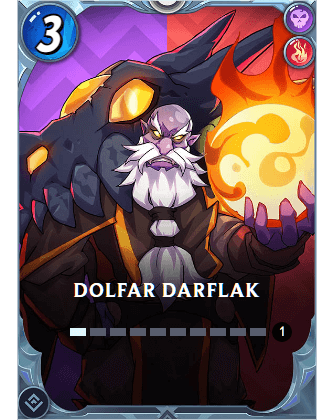
And here he is as a level 10 Summoner.
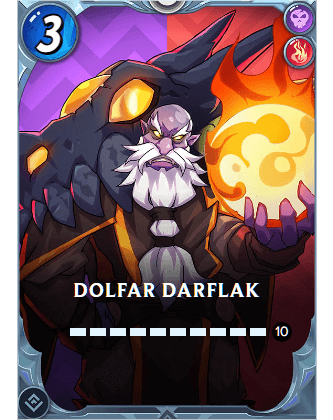
Nothing is different right? Well you would be forgiven for thinking that just by looking at the card image itself. However once you see his stats then you will see what has changed.
In your same Card Inventory screen if you click on any card it will bring you to their 'page'. It will list out all the cards you have of that same name/foil card. But if you click up on Stats in the upper right area you can see their stats:
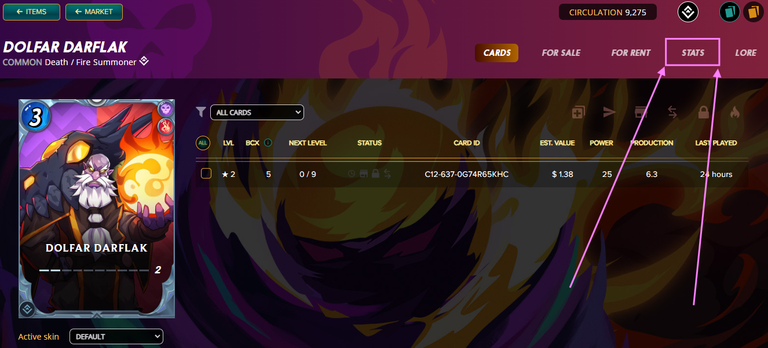
It will look something like this:
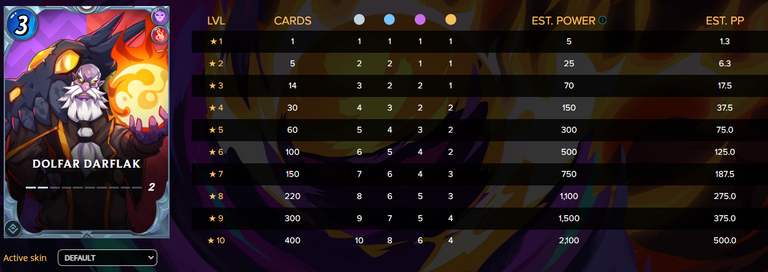
What we care about is the middle section here:
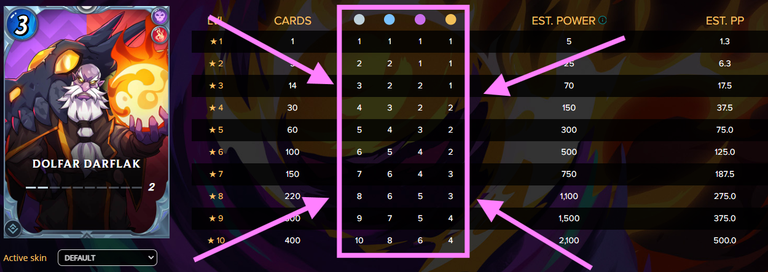
What I am pointing out is where it shows you what level Unit cards you can use with this Summoner card at each level it gets upgraded to.
So back to our original 2 card images (level 1 and level 10). If you have a Level 1 Dolfar Darflak you can bring into battle...
- Level 1 Commons Units
- Level 1 Rare Units
- Level 1 Epic Units
- Level 1 Legendary Units
Boring right? But pay attention, this doesn't mean if you have a level 2 Common Unit you won't be able to use him. It will just mean even though your Unit card is a level 2, when you use him in battle with this level 1 Summoner that Unit card will be downgraded to a level 1 Unit card.
You can tell by the cards will have a yellow triangle over them to tell you that your Summoner is not strong enough to use this Unit card to their full potential.
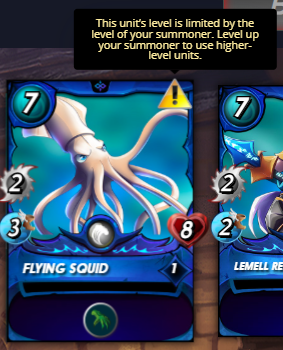
But back to our Level 10 Dolfar Darflak! Since he is level 10 he can use the following Units cards in battle:
- Level 10 Common Units
- Level 8 Rare Units
- Level 6 Epic Units
- Level 4 Legendary Units
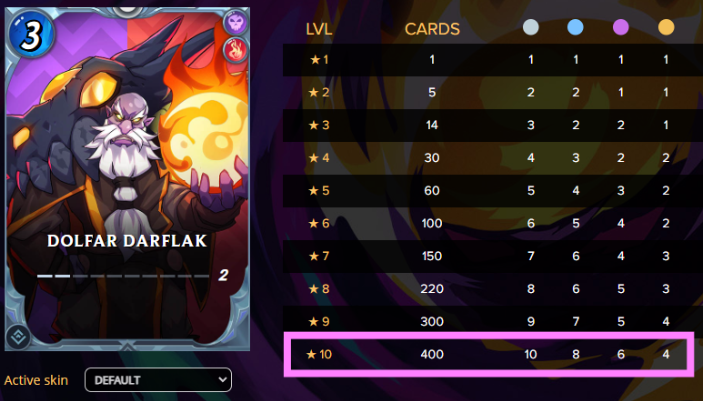
So if you are busy upgrading Unit cards make sure NOT to forget about your Summoner cards too. (this are generally more expensive than Unit cards as well)
Also something to note if you join a battle and the battle has a Mana cap of say 20. Whichever Summoner you pick counts against that Mana cap. So our Dolfar Darflak only costs 3 Mana which is super low but he is only 3 Mana because he doesn't have any cool abilities.
Summoners can have Abilities? Why yes they can.
Let's look at Tarsa as she is one of my favorites!
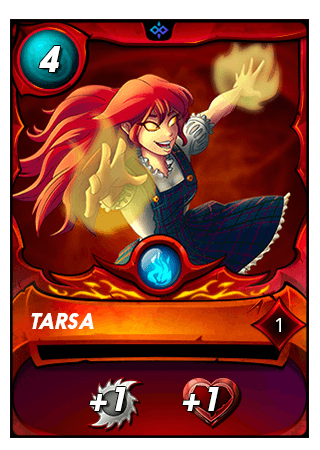
Those 2 icons at the bottom are +1 Melee Damage and +1 HealthPoints.
What that means is that when a battle starts she will give EVERY unit +1 Health and she will also give any Melee unit +1 Melee Damage. If you use these abilities wisely it could be the difference between winning or losing a battle.
Also if makes sense if you are picking a Summoner that gives +1 Melee damage to then use mostly Melee Unit cards to get the most out of that Ability!
Each Summoner falls into a Elemental Category. Tarsa for example is Fire Element. So if you pick her you can only choose Fire Unit cards and Neutral Unit cards. Neutral cards can be used with any summoner (unless a Ruleset/Modifier state otherwise).
Some Summoners (like Dolfar Darflak) have 2 Elements (like Fire and Death).
Units
Now once you have picked your Summoner you are going to pick which Unit Cards you want use as well. Unit cards are everything else besides Summoners. Most of these cards all have abilities of their own that you need to take into account as well. There are too many abilities to get into here but you need to find a strategy that works for you.
Each battle lets you up to 6 Unit cards:

The order matters. Normally Units in Spot #1 are going to be Melee units or some sort of tank unit to absorb the damage. Then after your Melee units usually goes Magic attacking Units and in the back are usually Ranged Units.
The reason for this is because Melee units can attack from the 1st position and so can Magic Units. But by default Ranged Units can NOT attack from the 1st position (unless they have a ability that lets them).
It can be daunting to pick Unit cards. Here I started a battle and choose Tarsa (fire) as my Summoner. So I will see Fire and Neutral Units to pick from.
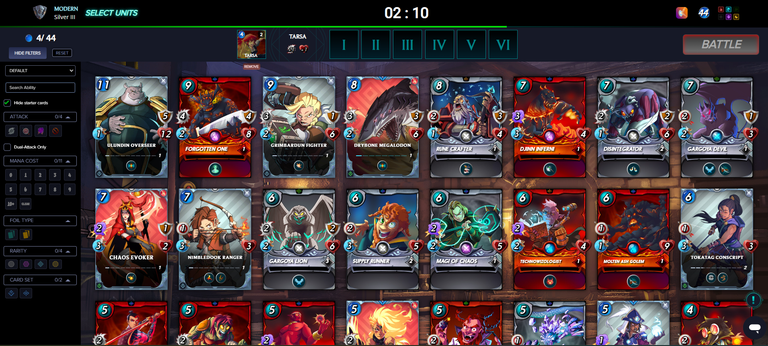
You can see that I am already using 4 of my 44 max MANA because Tars costs 4 Mana. Once you click on a Unit card it will pop up in that top row. You can click and drag those already selected cards around as you see fit.
To keep this battle going you can see the cards I picked and in what order. Since I picked Tarsa I picked Melee Units to get the boost of the +1 Melee Damage she gives out.
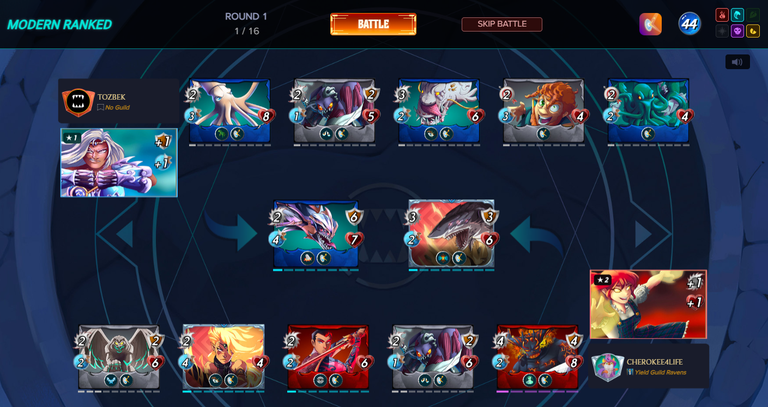
Here is the order of both teams:
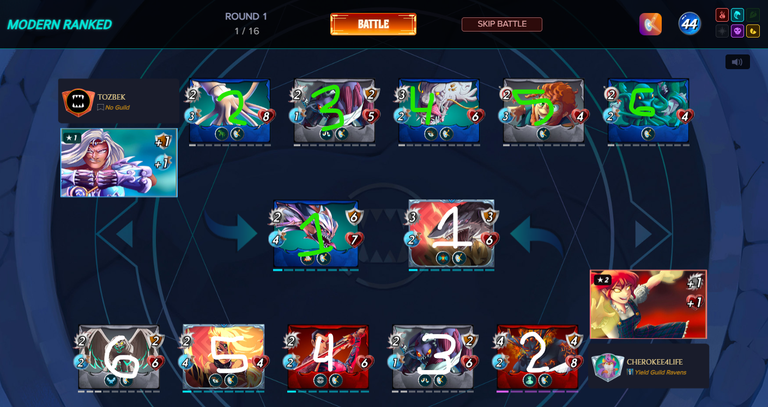
If any unit is destroyed on either team that team moves up in line as required. So if my Unit in 5th position dies then the Unit in 6th position moves to position 5.
(I lost this battle so we won't keep going with this scenario haha)
While Summoner are your Generals of a battle you won't win unless you have good troops and that is what you Unit cards are. Sure you could have a Level 10 Legendary Gold Foil Summoner but if all you have are crap units you are probably going to lose every battle.
It is a Ying/Yang balance between upgrading Units and Summoners. But if you have the cards available its never a bad idea to level up a card as you can. You just might not be able to use that card to it's fullest potential until you level up your Summoner too.

Cards & Sets
At the time of writing there are 6 Sets of card available to play with. Those sets are:
- Conclave Arcana
- Rebellion
- Chaos Legion
- Untamed
- Beta
- Alpha
- Other (Gladiator)

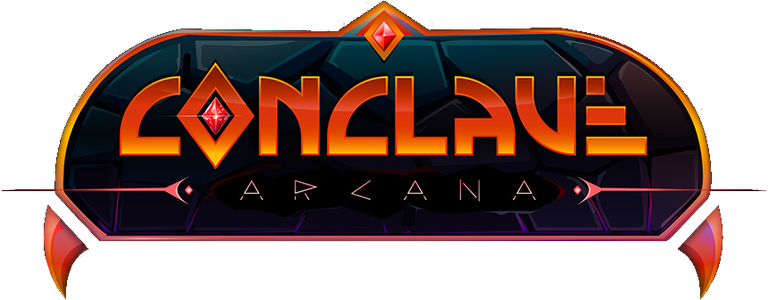
Conclave Arcana is the newest set that is set to release in April of 2025. We don't know too much yet about it except 1 major change and that is with Summoners. Currently you pick a summoner of a certain element and you can play Unit cards of that same element. Rebellion introduced dual element summoners. But Conclave Arcana is starting a new strategy..
Races!
From what I gather certain (or maybe all? idk) Summoners will be of a specific race, think like Venari as a race.

So if you choose to bring a Venari Summoner into battle you can play all those Venari units. I think each new Summoner would still have a element type and a Race type so you get to play extra cards sort of thing but time will tell!
I do not know how many subsets there will be for Conclave Arcana but we should find out more as time goes on.
What I do know for certain though is that there are 4 types of packs for the Conclave Arcana Release.
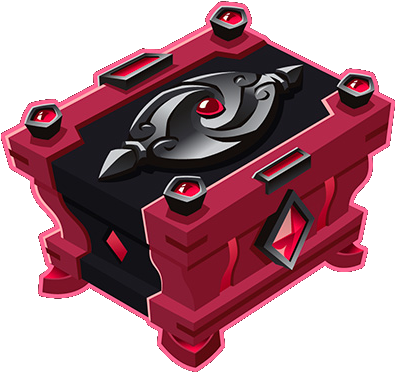
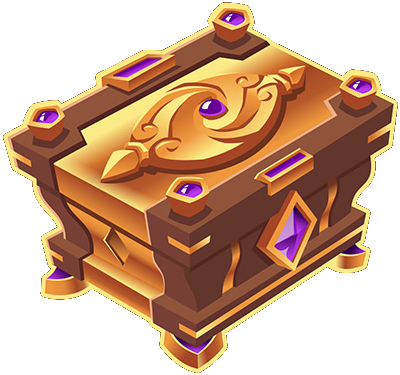
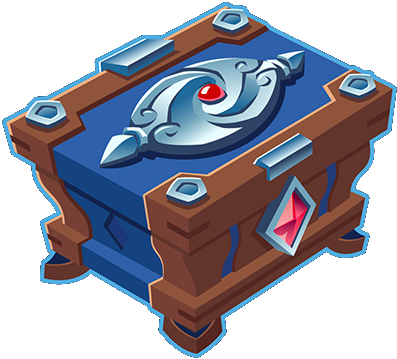
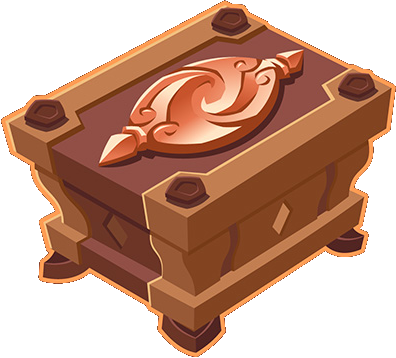

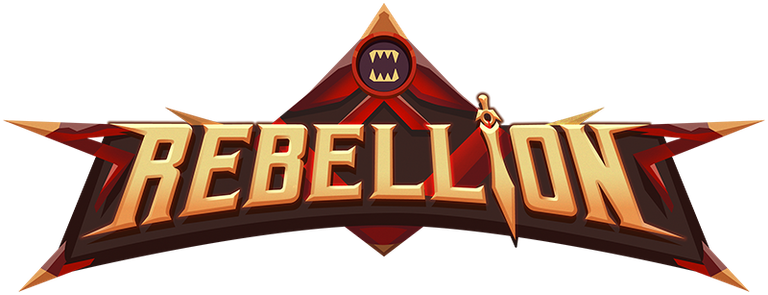
Rebellion is the newest set while Alpha is the older set. The Other/Gladiator set is at the bottom but not the oldest but it is it's own special thing so it gets to be at the bottom.
There are 3 subsets inside of the Rebellion Set:
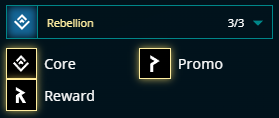
Those are as follows:
Core (188 cards)
Promo (34 cards)
Reward (86 cards)
Core Pack artwork:
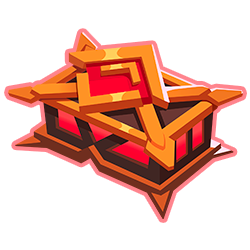
These statements apply to all Sets of cards unless otherwise stated.
Core cards are the normal cards that you would pull when you open packs.
Promo cards are the cards that are odd balls, they are put up for auction or sold off in not 'normal' circumstances (so not from packs or from Glint rewards)
Reward cards are the cards you can (or could have) purchased with Glint in the Glint shop (only for Rebellion and Chaos Legion)
All set card #'s are including Gold Foil and Regular.
Rebellion Cards are the easiest to tell apart because they all have this grey sharp border around them:
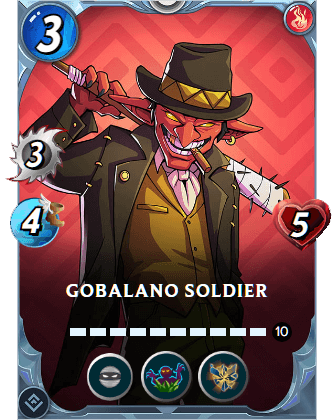

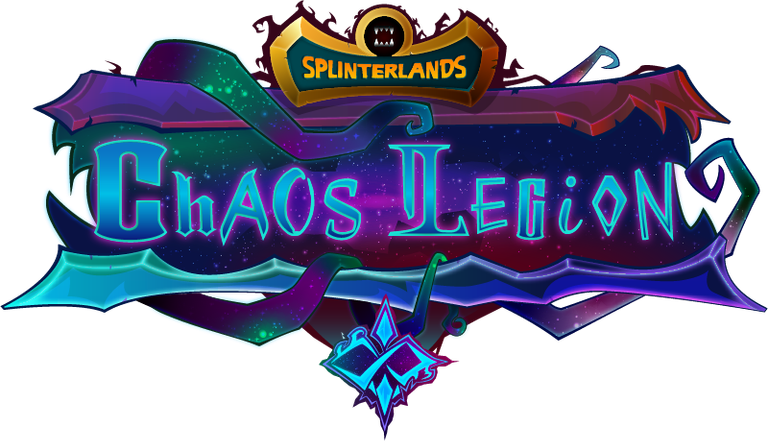
Chaos Legion is the 2nd oldest set and it is massive!
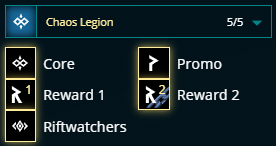
There are 5 subsets inside of the Chaos Legion set.
Core (206 cards)
Promo (16 cards)
Reward 1 (66 cards)
Reward 2 (86 cards)
Riftwatchers (86 cards)
Riftwatchers was just a mini set released under the Chaos Legion Set, originally some were airdropped to players who previously purchased Riftwatcher packs.

I am a tiny fuzzy on this but I think in Chaos Legion only Reward 2 subset were the Glint cards but I could be wrong there.
Chaos Legion cards look like this:
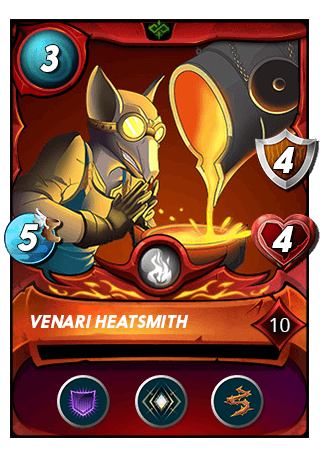


The Untamed Set is next
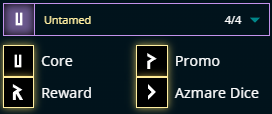
There are 4 subsets inside of the Untamed set.
Core (168 cards)
Promo (6 cards)
Reward 1 (72 cards) - originally obtained by completing Daily Quests
Azmare Dice (50 cards)

I believe the "Azmare Dice" subset are from old items called well Azmare Dice that acted like packs you could open and get these cards.
Untamed Cards look like this:
They have this molten lava crack type look to each of them.
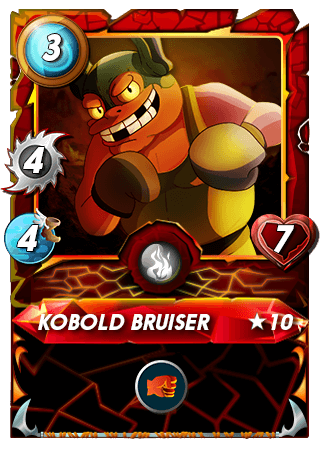


The Beta Set is next
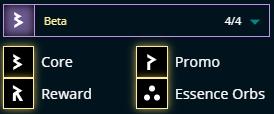
There are 4 subsets in the Beta Set and they are:
Core (158 cards)
Promo (12 cards)
Reward (98 cards)
Essence Orbs (24 cards)
Essence Orbs I believe were like the Azmare Dice.
Beta Cards look like this (I am pretty sure the Beta set was just a rerelease of the Alpha set with updated borders and texture:
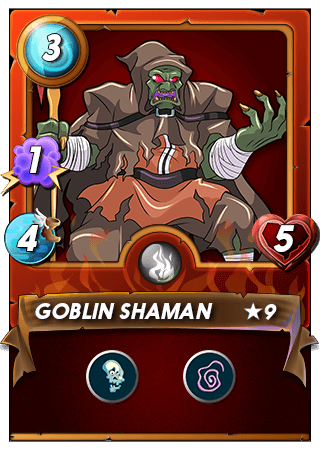


The Alpha Set is next

Core (118 cards)
Promo (8 cards)
Alpha cards to the best of knowledge are the original artwork of the Beta cards. So Beta & Alpha cards will look VERY similiar but they have different borders and textures:
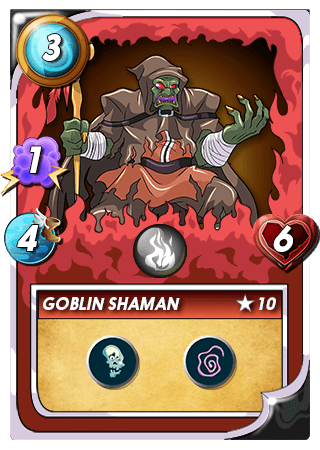

The last Set to talk about is the Gladiator (Other) set.

There is 64 cards in the Gladiator set currently.
Gladius Case Artwork:
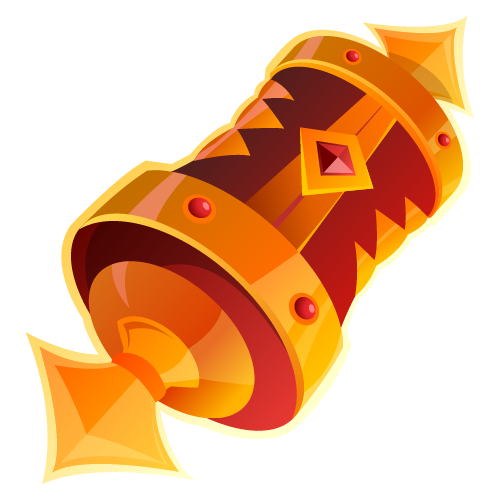
Gladiator cards are different than all the rest because they are cards that you do not "own" and by that I mean you cannot transfer them, sell then or rent them. You can level them up though. They are used primarily for Brawl fights or if you have a Summoner that has the ability to allow 1 Gladiator card in a normal battle.
Gladiator cards have this particular border and layout:
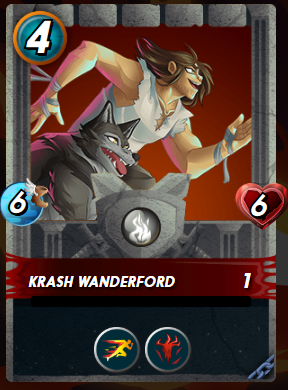

Reward Cards
For this section I am talking about Chaos Legion 'Reward 2' subset and the Rebellion 'Reward' subset. These cards are/were only obtainable from Gwen's Glint Shop.
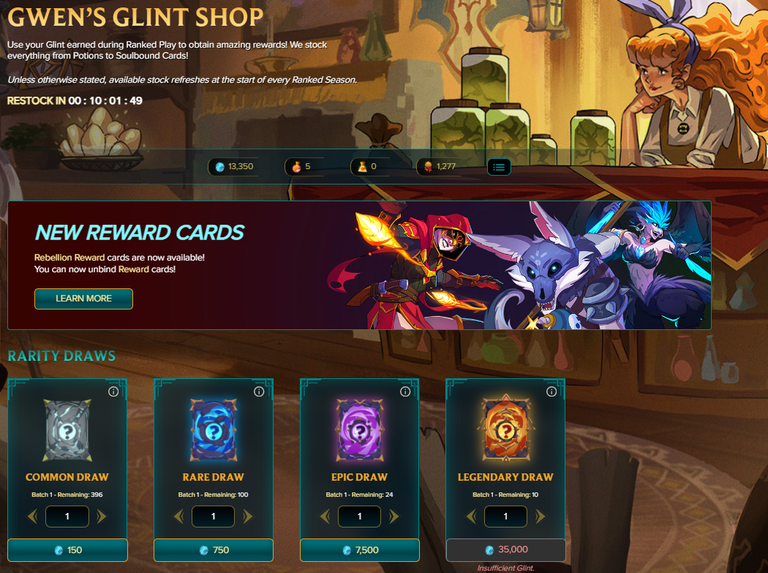
It is the ONLY place you can obtain these cards from Splinterlands (obviously and the secondary market) as they are not included in packs. Why this is important is because as you start battling and once you get out of the Wood league you will start to earn Glint. This is where you can spend your Glint. You cannot transfer your glint or sell it so you are going to get very familiar with Gwen and what she sells.
Every card purchased or obtained at Gwen's is soulbound (more on that next). What is nice though is that you can save up your Glint and purchase Gold Cards (it's still random which Gold Card you get but it's a guaranteed Gold card).
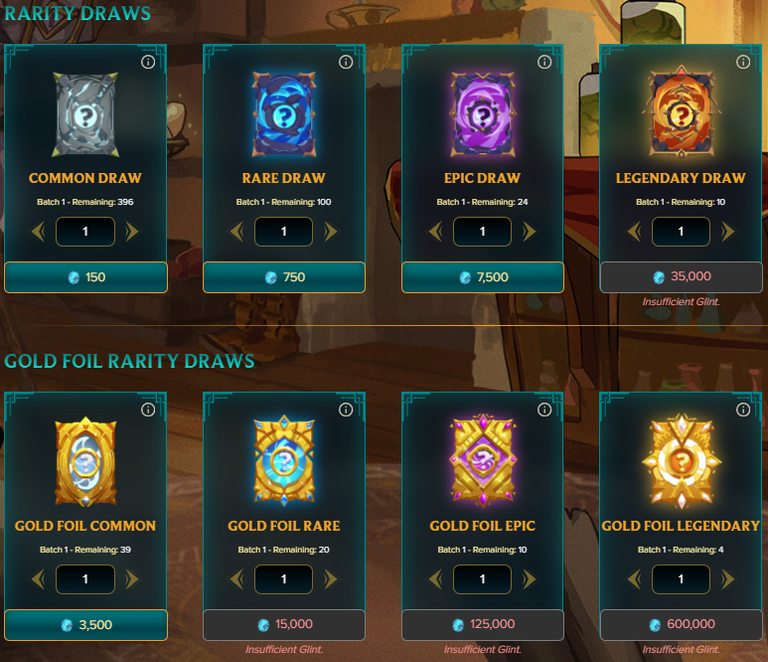
This all just adds another fun way to reward people who actual play the game and give them more opportunities to get good card without having to fork up more money upfront when just starting out!

Soulbound
And this is where the rubber meets the road. So when you buy a card from Gwen's Glint Shop that card is soulbound. What does that mean exactly? That means you can use the card to battle and you can level up that card just like any other card. But you can NOT sell it, transfer it or rent it without unbinding it.
Unbinding a Soulbound card costs DEC and it can get pricey. The price to unbind increases with the card level and the card rarity. As a new player you probably won't have any DEC and therefore won't have to worry about unbinding but it's still something you should be informed about.
Here I have 2 Rebellion cards.
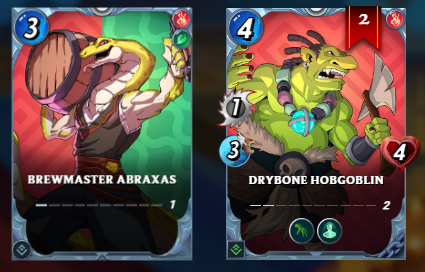
If you notice on the card on the right, in the bottom right corner of the card it has what look like chains. Those chains tell you that the card is Soulbound. Once you unbind it the image of the card will change to remove those chains.
If you click on the card to go into the details you will see a 2 little chains icon.
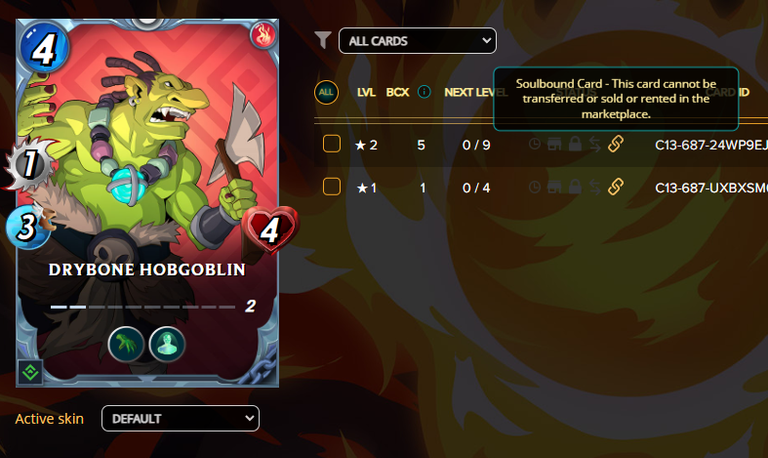
That is telling you it is soulbound as well.
To unbind my Level 2 Drybone Hobgoblin it would cost 500 DEC.
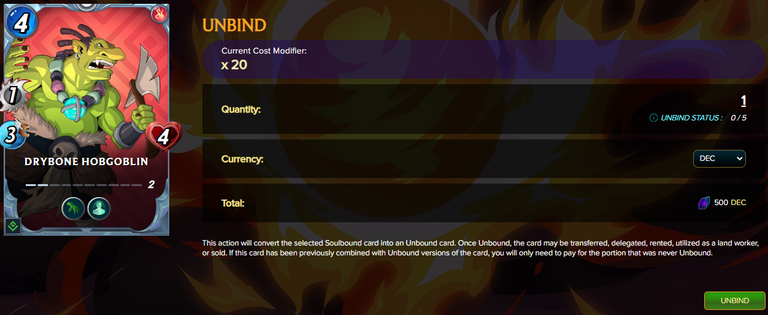

Abilities
Almost every card has a ability. These Ability effect your battles greatly.
Summoners can have abilities that they apply to every Unit of yours, or even every opponent Unit. There are even some abilities where it tells you to pick 1 or 2 units to apply this ability to before the start of the game.
Unit cards have abilities as well. And some cards as you level them up will gain new abilities as well. So keeping in mind what abilities do what is super important to winning battles and not just your cards. You need to look at your opponents past battles to see what strategies they use and what abilities they tend to use so you can counteract them.
If you hover your mouse over a ability a popup will appear telling you what that ability does.
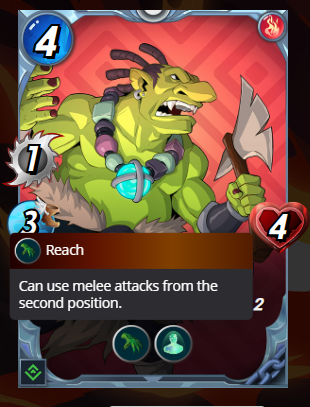

Levelling up Cards
Each card can be levelled up which increases it stats (usually, sometimes a level up does nothing but that is more rare). Levelling up cards is one of the most important ways to progress and get stronger in Splinterlands.
Once you have enough of the same card you can 'combine' them into the same card but just 1 level higher.
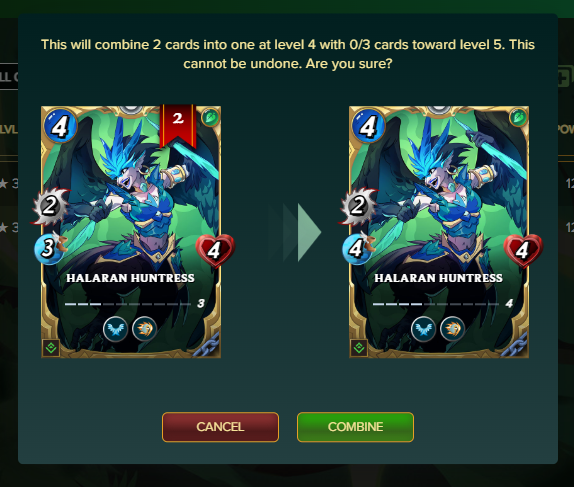
There I was combining 2 Level 3 Gold Foil Halaran Huntress cards into 1 Level 4 Halaran Huntress card.
Comparing the 2 images you can see the card on the left had a Speed of 3 while the card on the right (Level 4) has a speed of 4. So in this instance levelling up this card increased its speed by 1.
I am not in the market to sell my cards that I have duplicates of but if you are go for it. If not, then levelling up as much and as often as you can is the best strategy.
Let's take a look at my Lava Spider card.

As you can see I have 4 of them, and 1 of them I am delegating out to a friend. So I have 3 cards at my disposal. Well I need 5 total to level this guy up to a Level 2 card. (it shows 0/4 for the next level and it's confusing but that just means you need the 1 card you want to level up and then 4 more duplicates to burn).
So I don't have enough to make him a Level 2 card. But that doesn't mean I can upgrade him. I select all the cards I have (in this case 3 available) and then click on 'Combine'.
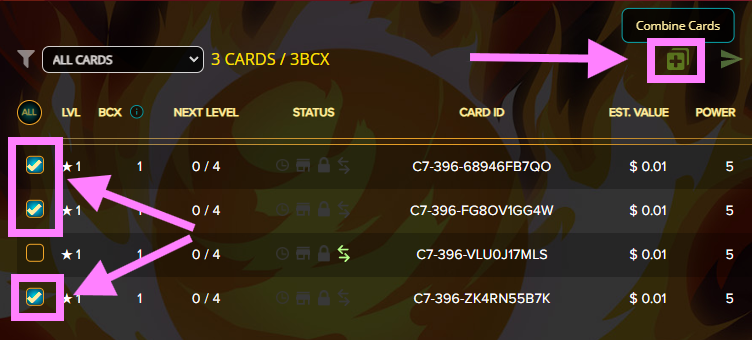
That will bring up a new popup showing me what my new card will look like.
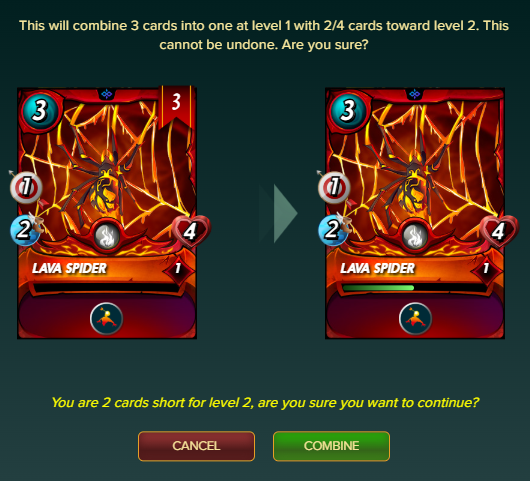
Pay attention to the Green Bar underneath his name.
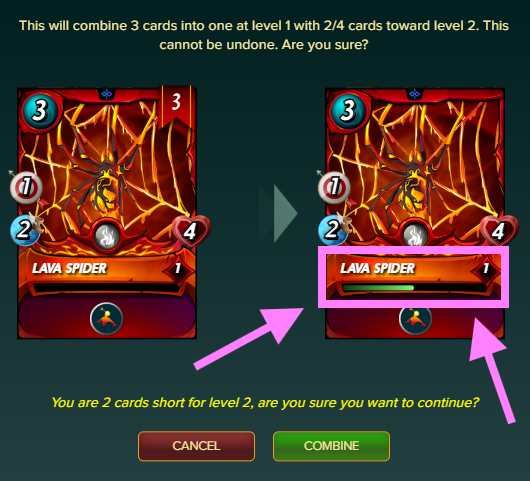
That is telling us that you have upgraded him some but not ALL the way to the next level. So you cards don't go to waste. You can level/upgrade each card 1 at a time if you want. Or you can keep them until you have enough and upgrade it all at once. The choice is yours

Mana - Speed - Melee - Magic - Range - HP
What does it all mean?
Each card has a few key stats to it that you need to pay attention to. Here are all of the possible stats. Keep in mind though that some cards may have multiple. For example some cards can have 2 different types of attacking power like Anachron Bolter can use Magic and Range attack during his turn.
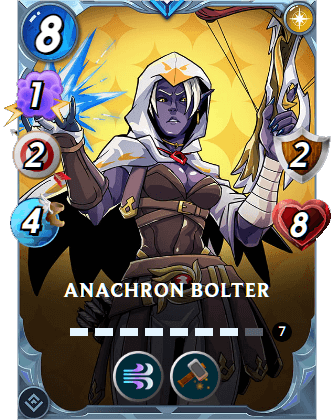


Mana
All Summoner cards do not have attacks but do have Mana costs.
All Unit cards costs Mana as well (well expect for 1 or 2 special old cards but we won't get into that here).
Each battle has a Mana limit that you have stay within. If the Battle limit is 40 Mana you can select cards that their mana is equal to or less than 40. You can NOT go over the Mana limit but you can go under. So pay attention to what cards you are picking and how much they cost.

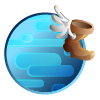
Speed
Speed determines what units go first. If you have higher speed your unit attacks before lower speed units in that particular round.

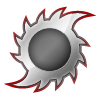
Melee
This is, well Melee damage. How much physical damage your unit will do to another unit. Some Melee units can attack your opponent Unit cards not in the first place but if you have a Melee unit in the first position it will attack your opponents 1st position card.
If the Unit you are attacking with has a Shield than Melee damage will damage their shield before it damages their Health.

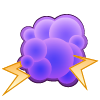
Magic
Magic attacks are fun. A unit with Magic damage can attack from any position. It will attack the Unit in position 1 unless abilities tell it to attack elsewhere. The fun thing about Magic damage though is that it ignores the opponents Shield and damages their Health. If a Unit has zero health but still have 5 Shield they will die regardless.

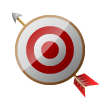
Range
Range attacks can attack from Position 2 through 6 (they can attack from Position one if they have the Close Range ability). Unlike Magic though range attacks will damage a Opponents Shield first and then their Health (just like Melee).

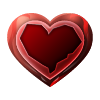
HP
This is how much Damage you can take before you die. There are cards who can heal other cards and boost Health stats so this can fluctuate a lot, even during a battle.

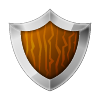
Shield
Your Unit's Shield is their armor. It will absorb all Melee and Range attacks first before damaging your Health. You can boost Shield stats with Abilities and can you can also 'heal' damaged shields with abilities.

That concludes or Article on Cards in Splinterlands. It is not an exhaustive guide but it should give you the basics and everything you need to know to get up and running and battling not like an idiot who doesn't know anything! Good Luck!

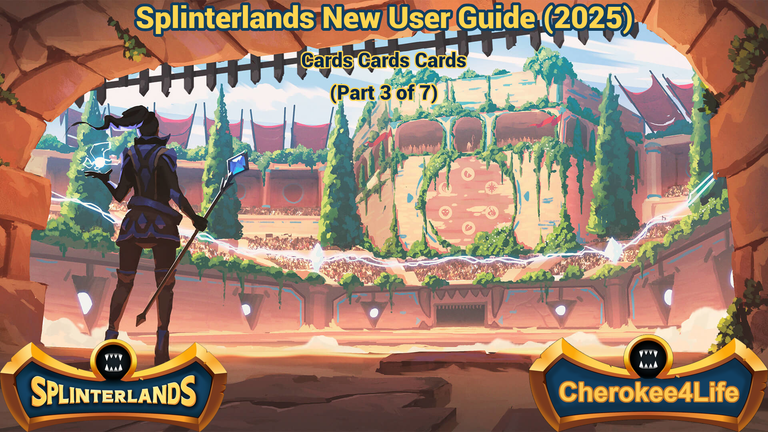
Congratulations @cherokee4life! You have completed the following achievement on the Hive blockchain And have been rewarded with New badge(s)
Your next target is to reach 4750 upvotes.
You can view your badges on your board and compare yourself to others in the Ranking
If you no longer want to receive notifications, reply to this comment with the word
STOPCheck out our last posts:
I hope new players will find the way to this blog series. Written very well with much detail, great work again!
I definitely am gearing it towards NEW players and I really hope they see it :)